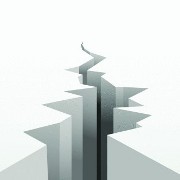 Photo: Getty Images
Photo: Getty Images
The horrific devastating earthquake in Japan is a reminder to be prepared for an earthquake in your area. According to Dr. Michael Blanpied of the USGS Earthquake Hazards Program, there are significant earthquake hazards in at least 39 U.S. states, affecting more than 75 million Americans.
A University of California in Los Angeles (UCLA) study revealed that 55 percent of the injuries during the Northridge, CA earthquake were caused by falling furniture or objects. One thing is clear--these injuries can be prevented if actions are taken before a dangerous earthquake.
Here are some simple tips to protect you and your family. Additional tips to secure other household items are available at http://www.daretoprepare.org/secure_your_stuff.html.
• Move heavy items to lower shelves
• Conduct a hazard hunt and look for objects which may be hazardous during an earthquake. For example, televisions, computers, water heaters, etc.
• Secure your space by strapping top-heavy furniture and appliances to walls
• Add latches to kitchen cabinets
• Secure TVs and other heavy objects which can topple and cause serious injuries
Another way to plan and prepare for an earthquake is to make a disaster kit. Your kit should be easily accessible in your home, place of work and car. Items in your disaster kit should include:
• Canned food
• Can opener
• Bottled water, purification tablets or chlorine bleach to purify drinking water
• Plastic bags for garbage disposal
• Flashlights
• Portable radios
• Batteries
• A first-aid kit
• Cash and credit cards
• Extra medications
• A whistle
• Fire extinguisher
• Crescent and pipe wrenches to turn off gas and water supplies
• Diapers and baby food (if you have an infant)
• Extra pet food (if you own a pet)
Other important items:
• Establish a meeting place where you can reunite with all family members
• Transportation may be disrupted; keep some emergency supplies at work (sturdy comfortable shoes, food, whistle, water, etc.)
• Identify and locate your nearest fire station, police station and emergency care facility
• It is often easier to call long distance after a disaster. Establish an out-of-state friend or relative to act as the "family contact." Make sure all family members have the phone number and address memorized versus programmed in their phone.
• Teach everyone, even elderly family members, how to turn off the gas, electricity, and water
• If you are indoors when an earthquake strikes, identify a safe place:
- Under a sturdy table
- An inside wall
- Away from glass, mirrors and heavy cabinets
• Finally, identify safe outdoor locations if an earthquake strikes. Open areas are generally the best. Stay away from buildings, trees, telephone and electrical lines, overpasses and elevated expressways
Sources:
http://www.huffingtonpost.com/andrea-chalupa/earthquake-weather-and-ho_b_493963.html
http://www.daretoprepare.org/whysecure.html
http://www.usatoday.com/news/nation/2011-03-11-earthquake-safety_N.htm




Add a CommentComments
There are no comments yet. Be the first one and get the conversation started!